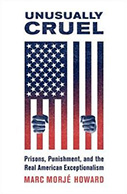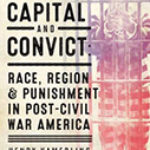Unusually Cruel: Prisons, Punishment, And The Real American Exceptionalism

Author: Marc Morjé Howard
Publisher: New York: Oxford University Press, 2017. 296p.
Reviewer: Robert Heynen | July 2018
That the United States justice system imprisons more people than any other in the world, both in absolute and per capita terms, is often noted but, argues Marc Howard, the nature of this divergence is rarely analyzed in depth. This is the goal of Unusually Cruel: Prisons, Punishment, and the Real American Exceptionalism, an ambitious and important study that provides detailed comparative evidence of the extent and characteristics of that ‘American exceptionalism.’ Howard takes the reader through the punishment ‘life cycle,’ tracing the cruelty embedded in the US system from plea bargaining through sentencing, prison conditions, rehabilitation, parole, and societal reentry. This extensive overview (each area receives its own chapter) is very useful, but its originality lies in the detailed contrasts he draws with the situations in France, Germany, and the UK. At each stage of the life cycle, Unusually Cruel meticulously brings together existing research to document comprehensively precisely how the US diverges from these ostensibly comparable countries.
The book’s most compelling accounts of unusual cruelty at the heart of the US system are the chapters on prison conditions and social reentry. Here the implications of retributive punishment are evident in the appalling treatment of prisoners, and the ways in which, through a lack of rehabilitative programing and the imposition of post-release penalties (e.g., loss of the vote, discrimination in work and housing, etc.), punishment often extends well beyond the sentence. This cruelty is especially striking when set against the rehabilitative focus and clearly delimited punishments of the French, German, and, to a lesser extent, British systems. These comparisons serve to ground the useful recommendations for change Howard makes in the book’s conclusion. There he stresses the abject capitulation of the Democratic Party in supporting the punitive tough-on-crime approach, but finds an emerging hope for change in growing Republican skepticism about the value of mass incarceration. Perhaps because he places such significant emphasis on Republican projects for reform and relatively little on, for example, the much more radical politics of penal transformation and abolition movements, his brief recommendations for change are sometimes a bit limited and reformist given the scale of the problems he lays out.
Howard’s comparative approach is very fruitful in providing empirical evidence for a critical understanding of punishment, but the question remains as to why, beginning especially in the 1970s, the US system diverged so dramatically from the comparator countries. His final chapter seeks to answer this question, arguing that four factors have shaped American exceptionalism: histories of racism; the rise of Evangelical conservatism (a particularly interesting and much-needed discussion); tough-on-crime politics; and the political economy of a privatized prison system. These provide some sense of the social contexts shaping the punishment life cycle and also suggest other avenues for further research. Most notably, what insights might be generated by other comparative studies, for example with countries whose rates of incarceration are closer to those of the US, even if they have seemingly very different political systems? For me, this provocative book also prompts a broader question: what might Howard’s comparative study of unusual cruelty tell us about our normative assumptions of liberal democracy and the nature of US politics and society more broadly?
Robert Heynen is an Assistant Professor in the Department of Communication Studies at York University in Toronto, Canada.


